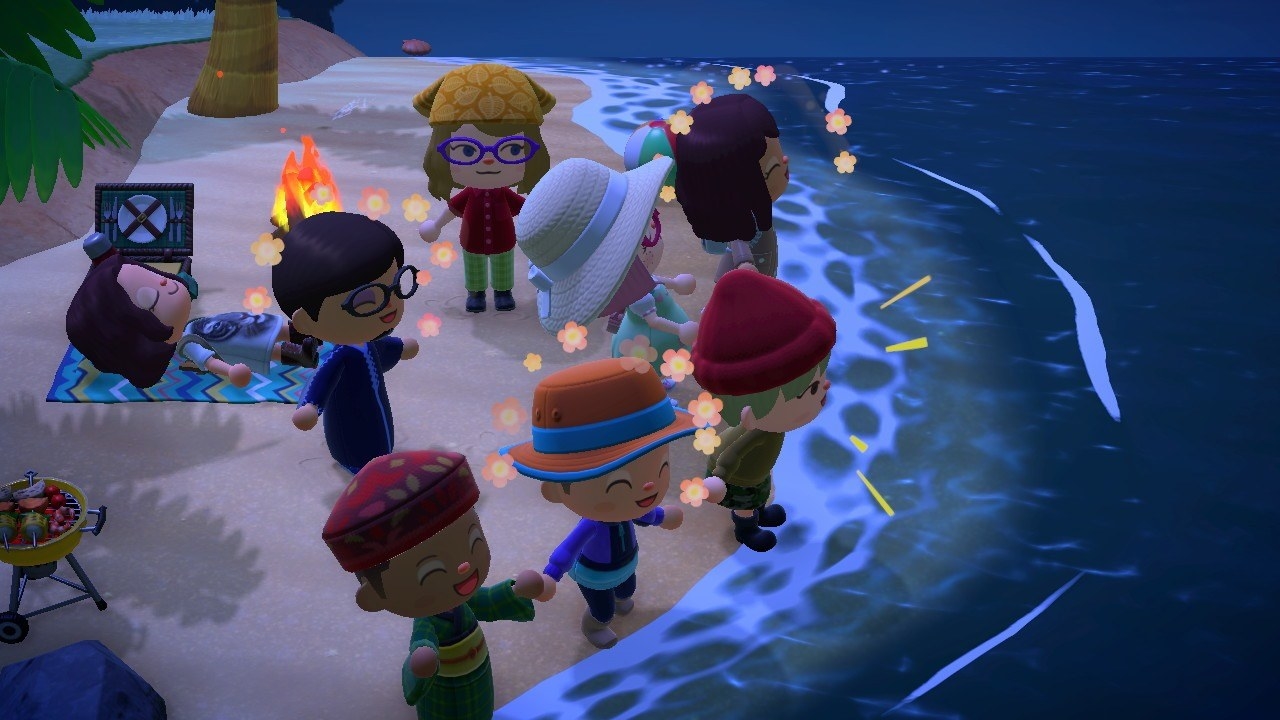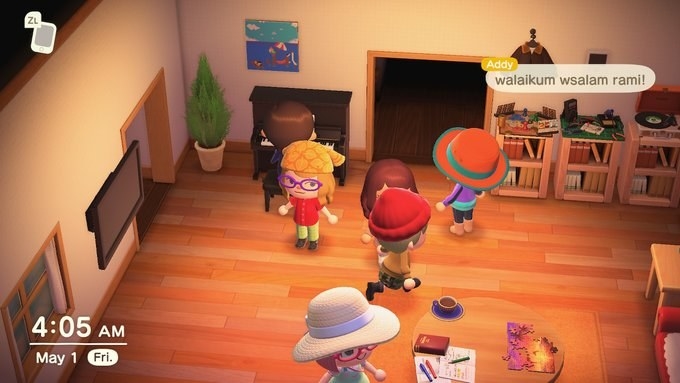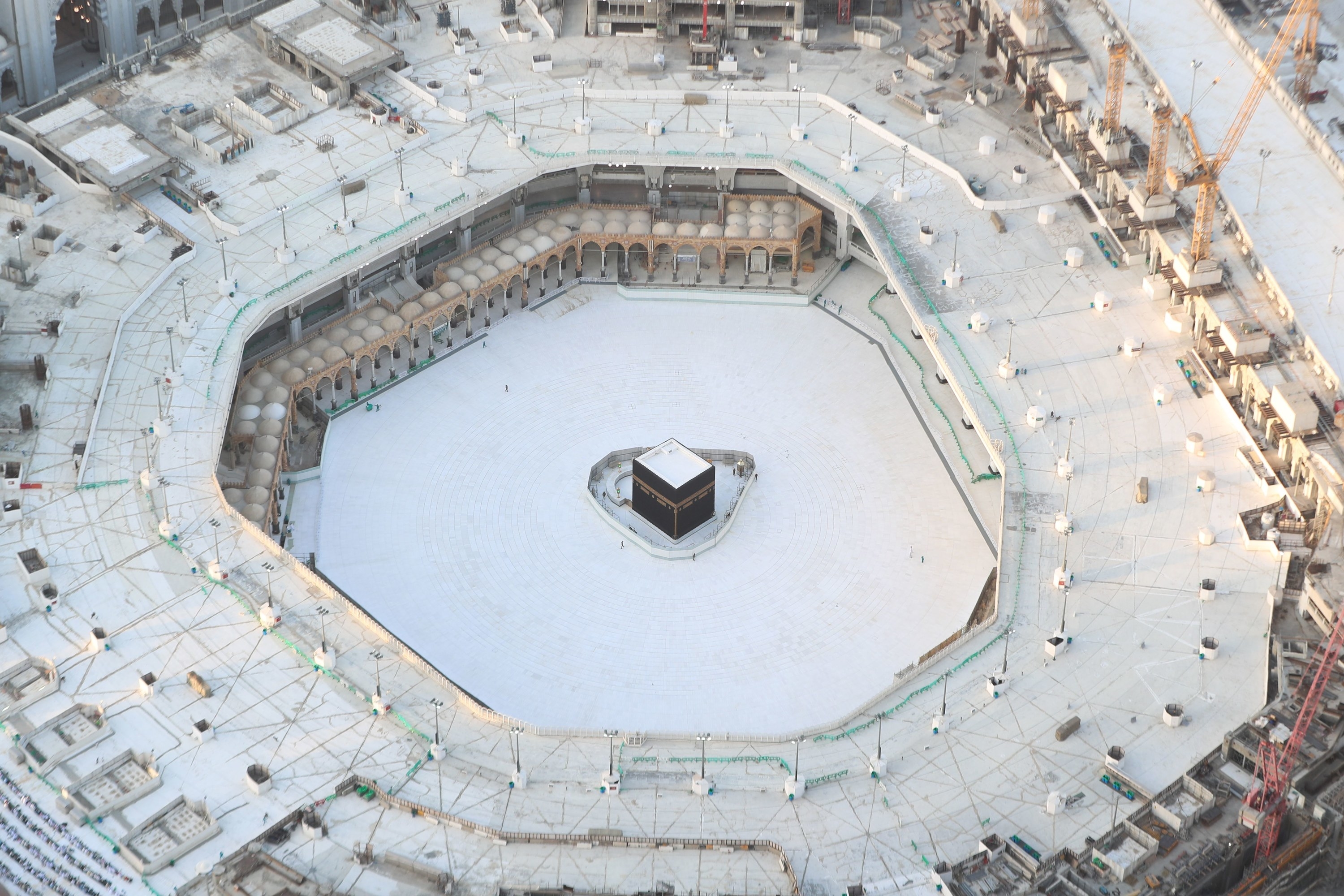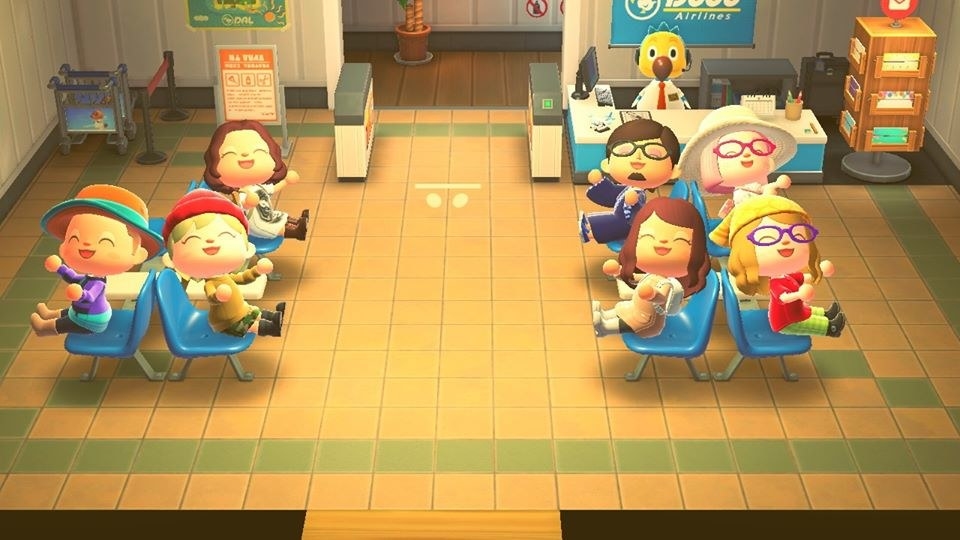The Coronavirus Canceled Ramadan Celebrations Around The World, So This Game Developer Re-Created Them In “Animal Crossing”
A few weeks into the height of the coronavirus pandemic causing lockdowns and stay-at-home orders around the world, Rami Ismail was doing what many of us have done in the face of this historic cataclysm: He was playing Animal Crossing.
He was participating in Bunny Day (the game’s version of Easter, which involves hunting hundreds of eggs just to build useless objects), when he had a thought: Why couldn’t Animal Crossing celebrate Ramadan as well?
Animal Crossing: New Horizons has become an escapist phenomenon during the pandemic — a bright point for people to escape their dreary indoor existence and instead be a tiny villager, wandering around a deserted tropical island in the bright sun doing mundane chores and interacting with talking animals and friends who can visit over the internet.
The game sold more than 13.4 million copies in its first six weeks — after launching worldwide on March 20, as many stay-at-home orders went into effect across the globe. It’s now the fastest-selling game ever for the Nintendo Switch, and the console itself has sold out at numerous stores and websites, becoming almost as difficult to find as Lysol wipes or hand sanitizer during the pandemic.
Ismail is a video game developer based in Hilversum in the Netherlands and has a large Twitter following of fellow gamers and game developers. He loves Animal Crossing, he told me, but playing it has highlighted the representation gap for Muslims in gaming — not just in the Animal Crossing franchise, but across the industry. The game is not even available in Arabic, he said.
“Christianity is often treated in sort of a secular way” in media like video games, Ismail told me, speaking over video chat from his home.
“Bunny Day is obviously very far removed from the Christian idea of Easter, and I thought maybe you could do that with Ramadan — take the culture and community of this religious event and make it into something similar to how Christianity often gets treated.”
Games like Animal Crossing, where you can virtually gather with friends and family playing in their own homes, have been fun ways to replace people’s actual social lives. The game includes its own versions of several major holidays, including Valentine’s Day, St. Patrick’s Day, Thanksgiving, Halloween, Christmas, and, yes, Easter. But Ismail realized that a game like Animal Crossing was unlikely to depict Ramadan.
“I think a lot of people are just scared of touching Islam as a subject, or a thing to add to their games. I think they’re likely afraid of being offensive, or afraid of making people angry and causing controversy,” Ismail continued. “It's just not an interest, despite Muslims being a quarter of the human population.”
So he decided to do it himself.
“I wanted to work a bit on the representation of Muslims in this game,” he said. “But also, as Ramadan got closer, I realized that I was very lonely.”
Ismail lives alone, about 30 minutes away from his family. But like many people all over the world, he hasn’t been able to see his parents during the outbreak due to a lockdown in his neighborhood and not wanting to spread the virus.
A huge part of Ramadan is about the community, Ismail said. Not just getting together with family and friends for iftar meals to break fast at the end of the day, but eating with strangers and gathering with large groups to celebrate in the mosque. He wanted to try to emulate that in a game that has been so appealing to people in quarantine precisely because of the community aspect.
He put out a call on Twitter, offering to host people to celebrate Ramadan on his island, and very quickly got a lot of responses from friends, internet acquaintances, and complete strangers. There was so much interest that he had to create a sign-up tool to ensure everyone could be distributed to different meals throughout the month (Animal Crossing only allows eight people to visit an island at one time).
Ismail decided to start hosting iftars and suhoors (the early morning meal before the sunrises) on Animal Crossing. He said so far he’s had 70 to 80 people visit his island for Ramadan, which began on April 23.
Although I did not sign up through official channels, Ismail was kind enough to let me join a suhoor at 3 a.m. his time, 9 p.m. my time in New York. All the guests called into Nintendo Voice Chat and flew our tiny villagers onto Ismail’s island.

twitter/tha_rami
Ismail (second to the left) and his suhoor attendees, including Ema O'Connor (center back), stand near the ocean on his island, emoting.
He had set up a long dinner table with custom-designed blue placemats with crescent moons and stars on them. There were candles and lanterns, and covered booths with plates of food and tea on them (even though Animal Crossing characters can only eat fruit and bamboo shoots, there is an array of food for sale that your character can stare at). This was similar to how Ismail and his friends and family often have IRL Ramadan meals in normal times, he told his guests, dining outside potluck-style, joined by some friends and family, and some strangers.
Because Ramadan lasts from one crescent moon to the next, the crescent moon is the month’s symbol. Animal Crossing takes place in real time: The season on your island is the season outside your window; when it’s 3 p.m. on Monday in your apartment, it’s 3 p.m. on Monday in the game; and the moon in the game is in the same phase as the moon in the real-life sky.
On the night I attended suhoor with Ismail, the moon was a few days from full, a few days from halfway through Ramadan. It hovered above his guests as we entered one by one, placed our shoes and little in-game gifts like peaches and espresso makers on the ground, and showed off our outfits. Most people’s avatars wore various head coverings, Ismail another guest wore customized thawbs, and one person came wearing a face mask, triggering someone to make a joke about Animal Crossing facing a “Nookvirus pandemic” (a reference to Nook Inc., the capitalist overlords of the game).

Ema O'Connor
Ismail plays piano as his guests explore his Animal Crossing house.
Once everyone had gathered at the table and admired Ismail’s set up, we just began talking.
Those who were breaking fast on the phone shared what they were eating IRL for their early morning or late evening meal — rice and meat in one case, fruits, nuts, and peanut butter in another. We talked about how we all knew Ismail.
One guest, Sarah Elmaleh, whose Animal Crossing character was dressed in her “‘90s singer-songwriter outfit,” as she called it — a beanie and camo pants — is a voiceover actor based in Los Angeles. She does voice work for video games, and she and Ismail do an online charity event together.
Another, Aiden Strawhun, is a journalism student at the University of California Berkeley and announced halfway through the evening that it was her birthday. Everyone made their characters clap.
The guest list of that event was unusual, Ismail told me later, in that most of the people attending were friends of his and nearly everyone was from the US. Usually he only knows a few of the attendees personally, and they are often from all over the world.
“I’ve had people from every continent,” Ismail said, looking at a list of his former guests. “I see Baghdad here, Singapore, Mexico, Central Europe, Ireland, South Africa, Sydney, Moscow, really just all over the place.”
“I think it’s honestly about 50-50 Muslim, non-Muslim,” Ismail said of most of his Animal Crossing meals. He said he had expected it to lean more toward non-Muslims because of his audience on Twitter, who are mostly gamers.
The non-Muslims who join, he said, have mostly been interested in asking questions about Ramadan, about the symbolism of the moon, and, of course, the question every Muslim gets asked each Ramadan: “You can’t even drink water??”
But no matter their religions, Ismail’s global guests have been his favorite part of the experience because one of the things he misses most about his pre-coronavirus life is the constant travel he did for work.
“This genuinely feels a bit like traveling,” he said. “I like talking to random groups of people, hearing about the weather, what they’re eating.”
The most interesting conversation he’s had in his Animal Crossing Ramadan meals so far, he told me, was with a man who lives right next to Mecca, the site in Saudi Arabia where the Prophet Muhammad and Islam itself was said to be born, and a site of pilgrimage for Muslims.
“I have never done the pilgrimage, and hearing somebody speak about it with such familiarity was fascinating to me,” Ismail said.

Getty Images
An eerie emptiness enveloped the sacred Kaaba in Mecca's Grand Mosque, Islam's holiest site, where attendance at Friday prayers was hit by measures to protect against the deadly new coronavirus.
Mecca is currently completely empty due to the lockdown to slow the spread of the coronavirus. Ramadan is normally a time when it is at its most full, when thousands of people pilgrimage from across the world to do the daily prayer and circle the Kaaba, the famous cube at the center of Islam’s most important mosque — the Great Mosque of Mecca. For the first time, in a picture of the empty landmark, Ismail could see the mosque’s floors.
“If Muslims were the primary moviemakers in our age, a shot of Mecca empty would be in every disaster movie,” Ismail said. “It’s a terrifying view. You look at it and you’re like, That is wrong. This should not happen.”
Because even when you’re on a deserted island, sitting at a table with a bunch of small people with giant heads surrounded by talking animals, the pandemic has a way of creeping into the conversation, tingeing even the most wholesome escapism with an undertone of horror.
After we sat at the table for a few minutes or hours (what is time?), Ismail took us on a tour of his incredibly impressive island and his home. We all oohed and ahhed at the soccer field he built and his Japanese garden. At one point, Sarah got stuck across a small pond and we all laughed, giving her advice on how to get out.
In some ways, it felt like a normal gathering of strangers — polite, a bit awkward, people coming and going based on their schedules. But, I realized after, this was the first time since the lockdown began that I got to meet new people, that I had to introduce myself. It was refreshing. It was something I didn’t know I had missed.
Hopefully we’ll all get to attend events like this in person sooner rather than later, but until then, Ismail is in the midst of making some big plans for Eid al-Fitr, which marks the end of Ramadan this weekend.
“Eid is much harder than Ramadan — I really want to do it in Animal Crossing, and I've been collecting gifts in case I do figure out something,” Ismail told me in a Twitter DM about a week after I visited his island. While iftars and suhoors are usually just a small gathering of people, Eid is a big festival full of people, more than the eight people Animal Crossing allows on an island at once.
Ismail said to solve this, to make it more authentic to the holiday, he’s been thinking of trying to create a “queuing system,” as he put it. Basically, designing an external website where people can sign up for a certain time slot, come to the island for 15 minutes or so, party there, and then head back out to let the next people fly in.
“Then at the end you can maybe send people a photo souvenir or something,” he said, adding that this would be his project for the next day and a half.
Outside of his deserted island, Ismail said he’s actually made Eid plans with some real three-dimensional humans.
“I'll definitely meet up with my family somewhere outside, and maybe just wave at each other from our cars,” he said. “It's not great, but it's something.” ●

twitter/tha_rami
At the end of the night Ismail's guests wait in the airport on his island to go home. This is a long process, just like the real airport.
The Coronavirus Canceled Ramadan Celebrations Around The World, So This Game Developer Re-Created Them In “Animal Crossing”
![The Coronavirus Canceled Ramadan Celebrations Around The World, So This Game Developer Re-Created Them In “Animal Crossing”]() Reviewed by Your Destination
on
May 25, 2020
Rating:
Reviewed by Your Destination
on
May 25, 2020
Rating:

No comments